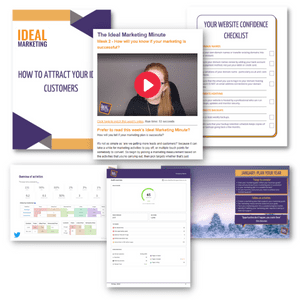
Like any other investment in your business’s growth, marketing comes at a cost. So, before you commit to any marketing activity, you need to get a clear idea of what your marketing budget should be.
Here’s how to make a marketing budget plan that works for your business and your bank account.
Talk to your sales team
The best way to find out why people choose your business or opt to go with a competitor is to ask the individuals who hear the answers to these questions on a daily basis – your sales team. All too often, sales and marketing operate separately from one another, meaning the valuable information your sales department gathers every day is not used as it should be to inform and drive marketing activity.
The key first questions to ask your sales team are:
- What are the sales targets and how have they been calculated?
- How do the sales team aim to meet these targets?
From there, you can find out what a customer is worth in terms of one transaction and in the ideal scenario that they become a lifelong customer. That way you can make an informed decision on what a reasonable marketing cost per customer acquisition will be.
Not only that, by working with your sales department as a team, your marketing efforts will be better understood by the wider business as you collaborate together in your common goal of growing your business. When meaningful marketing measurement metrics, related to the company’s business are in place, your marketing is on track to succeed.
Of course, not all businesses are large enough to have a dedicated sales team or even sales manager. Indeed, if you’re a small business owner, this is likely to be one of the many hats you wear. If so, it’s vital to take the same joined up approach to your sales and marketing involving your target income, where you are at present and what the difference is between these two figures. From there, you can identify which products and services you need to sell to fill this gap and work out how much you can spend on marketing efforts designed to help you achieve this.
Why spend money on marketing?
Before you start number crunching, it’s important to take a step back and reflect on what led you to arrive at the decision to invest in marketing. If there’s a small voice of doubt in your mind wondering whether you can afford it, or even a vocal stakeholder in the businesses questioning the cost, you need to ask, what can marketing do for me?
The answer to that question is that, done right, marketing will help you grow your business. However, it’s important to realise that this may not happen overnight. Research has shown that it takes on average seven touch points for a lead to become a customer. Not only that, although digital marketing gives us a greater choice of marketing methods which also often have the advantage of being low-cost, this means identifying what kind of marketing to pursue now involves a more complex decision-making process than in the past. It’s a crowded marketplace out there, and a well thought out strategy will pay greater dividends than spending money on shouting in an unfocused way.
So, if a pay per click advertising campaign, an article in the local newspaper or a social media campaign results in just one new client who has the potential to become a loyal customer, the cost of the marketing that led to that decision can be money well spent.
Ultimately, when it comes to well targeted marketing for your business, it’s important to see it as an investment in your business rather than a cost to it. And of course, the first step to finding the right marketing mix is working out what you can afford and making the very best of that budget. After all, like with any budget, if you fail to make a marketing budget, you will probably overspend.
Realistic goal setting
Deciding on and sticking to your budget means you can set attainable targets of what you actually want your marketing to achieve in terms of business goals and the revenue you need to be generating in order to make your marketing activities worth it. With this approach, you can also keep an eye on whether you are underspending or overspending on your marketing strategy.
A planned budget within an agreed timeframe of ideally at least twelve months, creates a solid foundation for measurable success on your business objectives. 7 – 8 % is an often-cited percentage of revenue recommended for small and medium-sized businesses to spend on marketing, but there is certainly not a one-size-fits-all number and of course it’s better to start with a small but strategic plan than it is to spend more money with a less clear idea of the desired outcome. The stage your business is at is an important factor too, as the needs and budget of a new launch are clearly different from a long-established business.
Start with your marketing funnel
Your marketing budget simply can’t exist without your marketing funnel, so before you make any decisions, it’s crucial to find out what’s happening in the journey from prospect to paying client. Your CRM system will provide valuable data such as site visits, lead generation, opportunities and new deals and the costs associated with these. If you are not currently tracking this kind of data and you haven’t identified a clear need in terms of the marketing you need, it’s a good idea to get this in place first. Again, this is where working in close collaboration with your sales team will pay off.
The marketing funnel works as follows:
Awareness
At this point your potential customer realises they have a need or a problem and begins to look for ways to address it.
Interest
The customer begins weighing up the pros and cons of the various options available.
Desire
Now it’s time to whittle the choice down to what looks like being the very best solution for their needs.
Action
The customer chooses who they want to give their business to.
Once established, your sales funnel is a goldmine of insight into your customers’ needs, desires and pain points. For example, if your sales funnel tells you that plenty of people are getting to the interest stage but discounting you before they make their final shortlist, this is where your marketing efforts should be concentrated to help push people over the finish line. Once you have identified what these strategies should be, either by doing your own research or getting advice from a marketing agency, then you will have a much clearer idea of the amount you need to budget for.
Research the competition
Simply copying what others are doing is never the path to success but an easy way to gain insight into what’s working for the competition is to simply have a look. Whether you organise focus groups, monitor competitors’ social media posts or set up a Google Alert to see when and where they are namechecked in the media, you can use others’ successful marketing strategies as the springboard for your own. But don’t forget what works for your competitors may not necessarily work for you; for example, if SEO research finds that the competition is so far ahead, you will never catch up, it will be best to focus elsewhere. However, if the same type of research finds areas where they are not performing well, you can target those.
When using this information to plan your own strategy it’s also important to keep how you want to differentiate yourself from the competition in mind, as well as what you have in common with those who are doing well in the same area.
Pick a strategy
The competition may set you on the right path, but don’t forget there may be other types of marketing that will work well for you. These include:
- Content marketing
- SEO
- Organic social media
- Email marketing
- Digital advertising
- PR
- Direct mail
Each of these come with their own costs, benefits and shortfalls, and very rarely will a company only do one form of marketing. It can feel complicated picking the right mix, so we’ve summarised the costs, timeline to results, and what each are good and bad for below.
| Type | Cost | Timeline | Good for | Bad for |
| Content marketing | ££ | ⏳⏳⏳ | Taking a potential customer through the marketing funnel on autopilot from attraction to sale. | Quick results, but some of the content required are long-form guides and videos that take time to build but are worth it! |
| SEO | £-££ | ⏳⏳ | Helping your ideal clients find you. | Keeping customers sticking around rather than landing on your site to read what they came for and leave. |
| Organic social media | £ | ⏳⏳ | Keeping potential clients thinking of you, aware of what you do and building trust in the brand. | Converting leads into sales. People turn off if you sell too hard and only promote yourself. Also social media algorithms don’t favour self-promotion . |
| Email marketing | £ | ⏳⏳⏳ | Easing potential customers through a marketing funnel, encouraging current customers to come back to you and building trust in the brand. | Attracting customers: Since GDPR has enforced good quality email marketing, you need to build a list that provides great content consistently, which can take time. |
| Digital advertising | £££ | ⏳ | Getting in front of your target market FAST and filling your marketing funnel with prospects. | Long term plans and small budgets – depending on the platform, you’ll need to make a minimum commitment and the minute you switch off the ads, your marketing mechanism is gone. |
| PR | ££ | ⏳⏳ | Raising awareness of your brand and building a positive impression of your expertise and authority. | Slower results and it can be difficult to prove return on investment. It’s hard to predict what will be picked up by the media and challenging to prove the exposure and impression PR makes. However, PR has the potential to make a big splash without high costs. |
| Direct mail
|
£££ | ⏳ | Getting in front of new potential customers and getting noticed, particularly if you’re creative with your mailer. | Long term results – once you send a campaign, you’re done unless you run it again to another area. |
Who will do your marketing?
A major factor in your marketing is who actually does it:
In-house
Got someone working for you already who has the time and capacity to fulfil your marketing needs? Fantastic! If not, you are likely to benefit from outsourcing marketing, particularly if your business is new to marketing. That way, if your marketing needs evolve, you can employ a marketing manager or specialist in the future, safe in the knowledge that the financial commitments involved in employing a new member of staff are justified.
Freelance
Freelancers can be a great solution both for one-off projects or repeat tasks. However, the flexibility they offer works both ways and your freelancer of choice may not always be available when you need them to be. Tapping into your network should result in some good options and remember that while top rates don’t always mean top work, you should be wary of anyone charging significantly below what you establish as the going rate. Remember, marketing is an investment and one you can’t afford to scrimp on if you want to see results.
Agency
A good agency can combine the best of both worlds, giving you the peace of mind of knowing your marketing is being taken care of by experts and the flexibility to decrease or increase your activity – or of course walk away within a pre-agreed notice period if your needs change or the relationship isn’t working.
Shop around for different quotes for marketing packages, taking advantage of free marketing reviews. That way, you’ll get an idea of what’s right and what it should cost. And don’t forget a good agency will never lie about future results, so from the beginning the conversation should always be about what goals can be achieved at various price points.
Whoever you choose to do your marketing, it’s important to make sure they are bang up to date with the latest innovations in digital marketing and the tools and skillsets required to do them.
The right marketing at the right price
Want to find out what marketing is right for your business and how you can make that work in line with your budget? Contact us today to arrange a free, no-obligation marketing consultation.

MD & Head of Digital Marketing
Jessica has worked in digital marketing for over 10 years and has watched it evolve from an experimental marketing option to an essential tool for most businesses. She is driven to help businesses achieve their objectives using the best digital marketing resources available and recognises that each business is different. Jessica devours the latest news about digital marketing and is constantly learning in order to stay ahead of the trends for clients.







